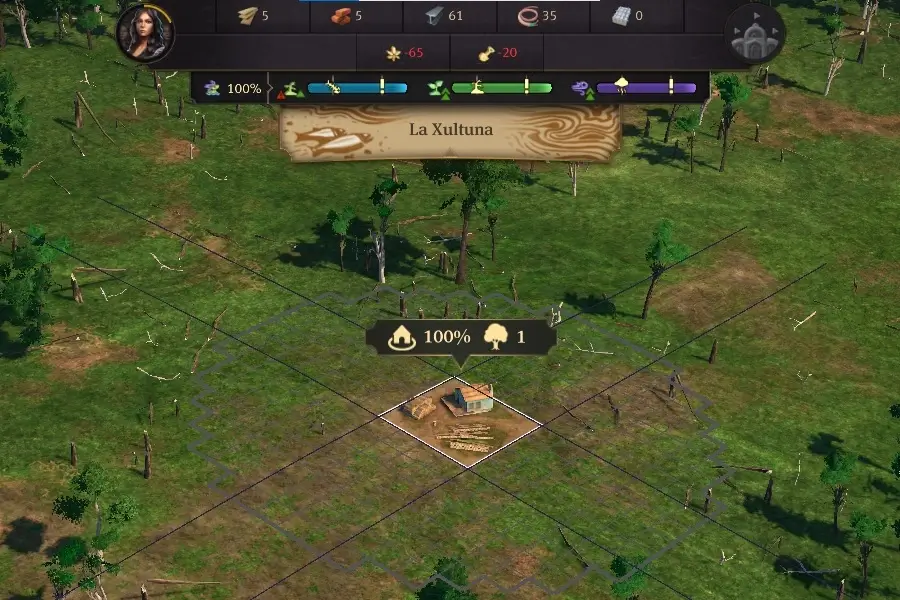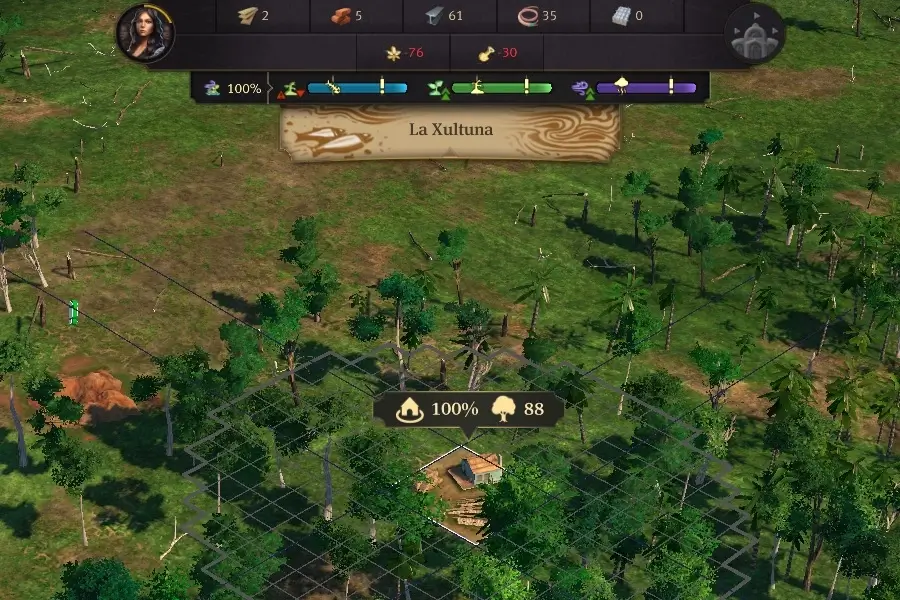What does the number next to the tree mean?
Posted on Jan 18, 2022

Placing a woodcutter Lumberjack's Hut doesn't need much consideration. At least, you'd think. Trees grow back, right? So what does the number next to a tree mean when you're building a Lumberjack's Hut?
Normally, placing a Lumberjack's Hut doesn't need much consideration.
Sure, having a few trees in the area already is a nice catch, but the lumberjack doubles up as the forester we know and love from Settlers.
But with the introduction of Game Update 13 of Anno 1800, things changed. Sometimes you'll see a number next to the tree when building a lumberjack's hut. Why is that and why is it important?
Table of Contents
The number next to the tree
Depending on where you place the Lumberjack's hut, the number next to the tree can be high or low. Have a look at this example.

The number 1 doesn't bode much good. Especially since the chosen area doesn't have many trees to cut down.

So this lumberjack, placed smack bang in the middle of a forest, has a number 88 next to it.
In regular campaigns or Sandbox mode, the amount of trees in the working area of the Lumberjack is not shown. That's because a Lumberjack also plants trees in the regular gameplay.
What does it even mean?
What does it mean?
Maybe you guessed it already?
The number next to the tree shows the exact number of trees available for the Lumberjack to cut down in his working area.
The first lumberjack can only cut down very few trees... Yes, just 1. 1 tree to make 1 log to make 1 plank in 15 seconds. Within the minute, this poor soul will be out of a job.
Compared to the second example, he's going to be very jealous. The number 88 stands foor 88 trees. That means work for 22 minutes (15 seconds per tree) and 88 planks to build with.
When is this number important?
The amount of trees only shows up when placing a Lumberjack's Hut in the Eden Burning scenario.
In regular campaigns or Sandbox mode, the amount of trees in the working area of the Lumberjack is not shown. That's because a Lumberjack also plants trees in the regular gameplay.
With the Eden Burning scenario, a Lumberjack only cuts down trees. Not plant them. Only a Forester can plant trees, but they're hard to get (you'll need special items for that).
So the number of trees is only really important when playing the Eden Burning scenario in Anno 1800 AND only when you don't have a Forester at hand.
On the road again?
88 trees sounds a lot. With the Eden Burning scenario, it actually is a lot. But you have to take one thing into account.
Building a road from the Lumberjack's hut to the nearest warehouse or Sawmill does clear some trees too. So depending on how space efficient you can lay down your road, you might only be able to get 80 planks from this Lumberjack.
Have a look at:
How to get Fertiliser in Anno 1800
New World Rising DLC for Anno 1800: Now live!
How to get influence in Anno 1800
Too Hard-Working jornaleros quest
Is it worth building Ship of the Lines in Anno 1800?
When can you build tractor barns in Anno 1800?
Docklands: 5 best things about the Anno 1800 DLC
How much does a Rigid Airship Hangar cost to build? (Surprise: it's a lot!)
Tagged as Guides The new world Eden Burning Scenarios
What you have to say (times 1)
Mason 3 years ago
Hi! I noticed the number in a regular game as well. Does it have a meaning in a normal Anno 1800 game (all DLCs activated)? Thanks!
Anno.City 3 years ago
Hi Mason!
Well, I did notice that as well. It's actually the exact opposite of what it means in the scenario.
In normal games, it is the amount of trees a Lumberjack's Hut needs to plant to reach 100% productivity.
Each Lumberjack needs 40 trees in their radius to be able to stay occupied all the time. When there aren't enough trees, you'll see lumberjacks come out of the hut, prepare the ground and plant a tree. The other Jacks won't start to work until all 40 trees are available.
So when placing a Lumberjack's Hut, make sure there are plenty of trees in the vicinity already if you want them to start cutting down trees immediately.
Hope that helps!
Leave a comment
Your email address won't be visible to others.